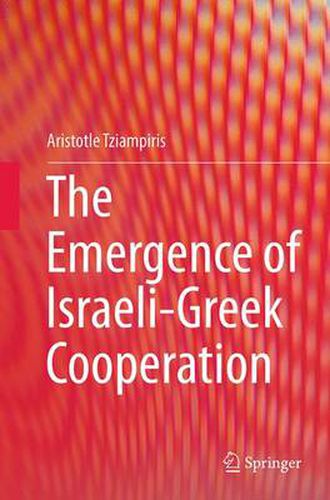Readings Newsletter
Become a Readings Member to make your shopping experience even easier.
Sign in or sign up for free!
You’re not far away from qualifying for FREE standard shipping within Australia
You’ve qualified for FREE standard shipping within Australia
The cart is loading…






This title is printed to order. This book may have been self-published. If so, we cannot guarantee the quality of the content. In the main most books will have gone through the editing process however some may not. We therefore suggest that you be aware of this before ordering this book. If in doubt check either the author or publisher’s details as we are unable to accept any returns unless they are faulty. Please contact us if you have any questions.
This book offers a detailed account of the recent Israeli-Greek rapprochement. For more than six decades, relations between Greece and Israel were characterized by suspicion, mutual recriminations and hostility. However, in 2009, Greek policy was unexpectedly overturned. This volume examines this new relationship in detail and explores its theoretical and regional consequences. The Introduction provides a general framework of Greek foreign policy within which the rapprochement with Israel was pursued. Chapter I presents the book’s theoretical framework, focusing on balance of power theory and emphasizing the arguments of Morgenthau, Waltz, and Mearsheimer. Chapter II delineates the fraught relations between the Greeks and the Jews, despite their cultural and historical commonalities, and analyzes the reasoning behind decades of antagonistic foreign policy. Chapter III describes how the rise of Turkey during Greece’s economic crisis and the gradual deterioration of the strategic partnership between Israel and Turkey combined to create a climate open to Israeli-Greek cooperation. Chapter IV examines the beginning of the rapprochement between Israel and Greece, highlighting Netanyahu’s historic 2010 visit to Greece. Chapter V explores the intensification of Israeli-Greek cooperation. Chapter VI discusses energy cooperation in the Eastern Mediterranean, another key factor in the deterioration of Israeli-Turkish relations and the strengthening of ties between Greece and Israel. The book concludes with a return to theory, reiterating the Realist approach and using that framework to hypothesize about the future of the relationship between the two nations. This book is appropriate for graduate students and academics studying international relations and foreign policy in the Eastern Mediterranean, as well as policymakers, activists and journalists who want to have a clearer understanding of the Israeli-Greek rapprochement and other developments in the region.
$9.00 standard shipping within Australia
FREE standard shipping within Australia for orders over $100.00
Express & International shipping calculated at checkout
This title is printed to order. This book may have been self-published. If so, we cannot guarantee the quality of the content. In the main most books will have gone through the editing process however some may not. We therefore suggest that you be aware of this before ordering this book. If in doubt check either the author or publisher’s details as we are unable to accept any returns unless they are faulty. Please contact us if you have any questions.
This book offers a detailed account of the recent Israeli-Greek rapprochement. For more than six decades, relations between Greece and Israel were characterized by suspicion, mutual recriminations and hostility. However, in 2009, Greek policy was unexpectedly overturned. This volume examines this new relationship in detail and explores its theoretical and regional consequences. The Introduction provides a general framework of Greek foreign policy within which the rapprochement with Israel was pursued. Chapter I presents the book’s theoretical framework, focusing on balance of power theory and emphasizing the arguments of Morgenthau, Waltz, and Mearsheimer. Chapter II delineates the fraught relations between the Greeks and the Jews, despite their cultural and historical commonalities, and analyzes the reasoning behind decades of antagonistic foreign policy. Chapter III describes how the rise of Turkey during Greece’s economic crisis and the gradual deterioration of the strategic partnership between Israel and Turkey combined to create a climate open to Israeli-Greek cooperation. Chapter IV examines the beginning of the rapprochement between Israel and Greece, highlighting Netanyahu’s historic 2010 visit to Greece. Chapter V explores the intensification of Israeli-Greek cooperation. Chapter VI discusses energy cooperation in the Eastern Mediterranean, another key factor in the deterioration of Israeli-Turkish relations and the strengthening of ties between Greece and Israel. The book concludes with a return to theory, reiterating the Realist approach and using that framework to hypothesize about the future of the relationship between the two nations. This book is appropriate for graduate students and academics studying international relations and foreign policy in the Eastern Mediterranean, as well as policymakers, activists and journalists who want to have a clearer understanding of the Israeli-Greek rapprochement and other developments in the region.